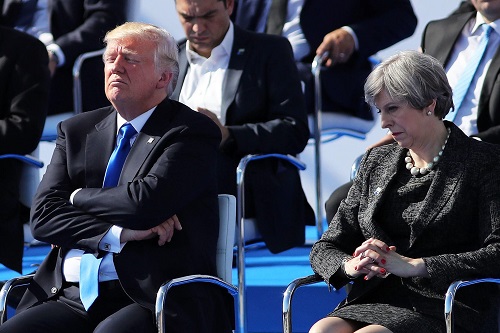AFP photo
By
Tom Arms
The Special Relationship has its downsides. There is no doubt that there is a special relationship between Britain and the United States. There are heavy steel chains forged through centuries that bind us genetically, culturally, legally, linguistically, militarily, politically and economically.
At the moment the political and economic links and similarities have a particularly strong downside.
Economically the rest of the world is OK. Not much more than OK but definitely OK. Planet Earth’s balance sheet is likely to grow by a healthy 3.5 percent this year and do even better—3.6 percent—next year.
China is the main reason. Its growth forecast has been revised upwards from 6.6 to 6.7 percent. And the EU—which a year ago had been written off as an economic and political disaster zone on the verge of collapse—is actually doing quite well with growth up a healthy 1.9 percent over the previous year.
Britain and America are the only two big black clouds in this otherwise bright blue economic sky. This week the International Monetary Fund, who is responsible for making all these forecasts, reported that the growth in US economy is expected to shrink from 2.3 to 2.1 percent in 2017. The British are even worse off. A year ago they had one of the healthiest growth figures in the Western world—if not the healthiest. In 2017 the British economy is expected to grow only 1.7 percent.
But that is not all. In the past two successive months the Bank of England has issued stiff warnings about the danger of rising household debt. Wage rises are stalled. Nearly a decade of government austerity policies are cutting living standards and the queues at the foods banks are growing.
The public are acutely aware of the dangers of increased mortgage borrowing. That lesson they painfully learned in 2008-2010. They are not borrowing against their homes. Instead they are effectively borrowing against their credit cards by delaying payments. Credit card debt in the UK has risen by ten percent this year.
And, because they don’t have the cash, they are taking out unsecured loans with finance companies to buy their cars. In fact, over the past ten years the number of cars bought with 100 percent loans has risen from 30 to 90 percent of all new car purchases.
Of course whatever Britain does America can do bigger and better. US household debt is back up to where it was in 2008 at a staggering $12.6 trillion. Last year saw the largest increase in household debt in over a decade– $460 billion.
The American methodology is very similar to that of their British cousins. Mortgages are now sacrosanct. The number of delinquent mortgagees has dropped to 5 percent. However, credit card debt is up $32 billion, followed by student loan debt up by $31 billion and car loans up $22 billion. Like the British, unsecured borrowings.
There are political similarities as well. Both countries are lumbered with leaders who have created a climate of suspicion, uncertainty, weakness and an atmosphere of crisis. In the case of Britain the roots are in the 23 June 2016 Brexit vote. In its aftermath Prime Minister Theresa May attempted to project the image of a strong and stable leader. Then she lost her parliamentary majority in an unnecessary election; lost control of her cabinet and singularly failed to climb over the first hurdle in negotiations with the EU or to present anything remotely resembling a coherent negotiating strategy.
On the other side of the pond, Donald Trump is his own twitter-fed crisis. He has circled the wagons around the White House and is busily shooting tweets at Democrats, fake news, Hillary Clinton, Barack Obama, members of his cabinet and almost everyone to whom he is not related to at least by marriage.
Both countries need a special relationship with special leaders to solve especially difficult problems. Neither have it.
Tom Arms is the editor of LookAheadnews.com. Sign up now for the weekly diary of world news events.
LookAhead Radio World Report for week commencing 31 July 2017:
Tom Arms
I am a journalist, entrepreneur and historian with extensive experience in print, web and broadcast journalism. I started as a diplomatic correspondent, wrote several books (The Falklands Crisis, World Elections On File and the Encyclopedia of the Cold War), and then in 1987 started my own business (Future Events News Service, www.fensinformation.com) which over 25 years established itself as the world and UK media’s diary. Our strapline was: “We set the world’s news agenda.” I sold FENS in December 2012 but retained the exclusive broadcast rights to all of FENS data. To exploit these rights I set up LookAhead TV which produces unique programmes which “Broadcasts Tomorrow Today” so that viewers can “Plan to Participate.” LookAhead has appeared regularly on Vox Africa, Radio Tatras International, The Conversation and Voice of Africa Radio.
In addition to being a syndicated broadcaster and columnist on global affairs, Tom is also available for speaking engagements and can be contacted on Twitter, Linkedin and email: [email protected].



No Comments Yet!
You can be first to comment this post!